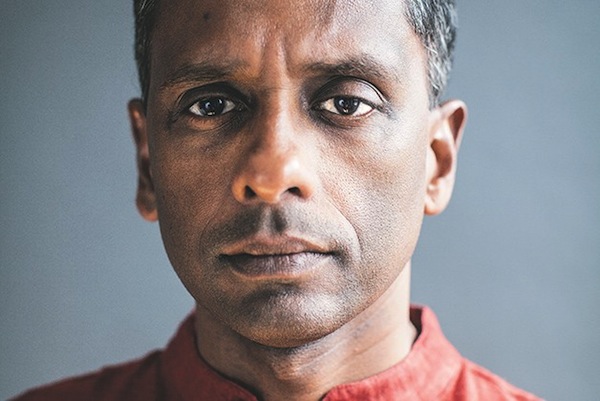The Hungry Ghosts is Shyam Selvadurai’s fourth novel, and almost certainly his best. The themes are familiar, from the personal strife caused by the narrator’s sexuality and ethnicity, to the political backdrop of Sri Lanka’s civil war, but the whole narrative is handled with an accomplishment and quiet authority that marks a real step up in Selvadurai’s prose.
The novel jumps between Toronto and Colombo across the 80s and 90s, telling the story of Shivan, a young man whose life is dominated by his own struggles to come to terms with his homosexuality, and the impact of his domineering grandmother on his family life. As the novel opens, Shivan is preparing to travel back to Colombo to bring this fearsome matriarch to Canada after the latest in a long series of strokes. And over the next 350 pages, and one night in the text, Shivan struggles to come to terms with his past and what he must do to be able to move on from it.
This is a story that is both resolutely about the late-twentieth century that it takes as its timeframe, but also about the role of longer term history in individual lives. Buddhist tales form the allegorical backbone of the text, with the “hungry ghosts” of the title referring to individuals who desired too much in life and are therefore condemned to be constantly hungry but never able to eat in their afterlife. Karma and predestination are a constant undercurrent here, as Selvadurai says in his acknowledgements at the end of the book, but this is also a more pragmatic tale of the effect that each generation has on the next, and the need to break the cycles of family trauma that lead to the creation of new “ghosts”, and the repetition of pain and crimes.
Shivan’s grandmother, a terrifying matriarch who runs a property empire in Colombo through the iron fist of her hired thug Chandralal (I will leave you to decide who this figure represents after he becomes first a rich property developer in his own right, and later a government minister), and adopts her half-Tamil grandson as the heir to her fortune. However, as he grows into a beautiful, and openly gay, man, his relationship with a human rights worker and former school friend begins to tear him in two. On the one hand he is drawn to the power of running his grandmother’s affairs, and finds himself open to the corruption that entails, and on the other he has a profound love for a morally pure man that is simply unacceptable for both his society, and in particular his grandmother.
The way this situation plays out is one heart of the novel, but in reality the whole is more complex. The grandmother is deeply damaged by an event from her childhood, and because of this has made of herself a “hungry ghost”, and the outcome of her anger and pride is to damage the lives of her daughter and grandson in the same way. Their behaviour and even their language come to echo hers, with their own traumas turned into engines of rage that drive them to hurt those around them and unconsciously repeat her mistakes.
The consequences of the older generations’ sins being bourne by the younger is, of course, echoed by Selvadurai’s usage of Sri Lanka’s political and actual conflicts as a backdrop, with the parallels between the violence and politics of the civil war and the turmoil within Shivan’s family clearly, but always subtly drawn.
But ultimately, despite its obvious political and historical message, this is a resolutely personal narrative. Everything here is filtered through the consciousness of Shivan, with the revelation of other characters feelings and thoughts skilfully deployed so that we are fully aware of his self-absorption, and his lack of perspective on others. This is a character with whom you come to empathise deeply, so much so that more than one reviewer has compared it to reading a biography, but he is also a character who is shown as deeply damaged and flawed, with all the consequences this entails. The fact that this damage, and the effect it has on all his relationships and perceptions is presented largely unanalysed, and certainly not apologised for makes for a powerful presentation that emerges as if by stealth from the seemingly straightforward writing style. That the other characters, necessarily only partially presented through Shivan’s perspective, emerge fully formed and equally complex is also remarkable.

The immigrant experience adds a further layer, as emigration to Canada leaves Shivan feeling both alien and unaccepted in his new home, and foreign and distanced from his homeland. It leaves him with both a “longing” and a “revulsion” for his country, and burdened with always having explain his Sri Lankaness to his new life, and his foreignness to his old. At the point from which Shivan relates his tale he is, like his mother and grandmother, and like Sri Lanka itself after all its conflict, “like that old Sinhalese saying: rice, once cooked, cannot revert to its former raw state.” He cannot go back to being what he was, or escape the consequences of his past, but there is a suggestion that he can learn how to move forward with it, even if that move will be deeply problematic.
It is striking, then, that unlike Funny Boy, Selvadurai’s first novel, and other ex-pat Sri Lankan novels like Ondaatje’s Anil’s Ghost, this novel ends not with a departure from Sri Lanka, but a return. It is a narrative that remains fundamentally unresolved, but one that speaks painfully of the effects of trauma and what can be done, if anything, to end cycles of repeated misery – and this decision to come back feels key in that, even if there is clearly no guarantee it will work, or be without pain of its own. Selvadurai’s deceptively simple and clear prose style tackles all this whilst remaining at heart an absorbing and personal novel that feels like an author’s coming of age, and a work of considerable stature.
For an interview with the author on The Hungry Ghosts, click here.
Shyam Selvadurai, The Hungry Ghosts, (Viking, New Delhi, 2013). ISBN: 9780670085750.
###
Editors note: This review first appeared on The Republic Square, in a shorter form. Groundviews has come to rely on and trust RSQ as a new media initiative in Sri Lanka that provides very useful updates on current events.

